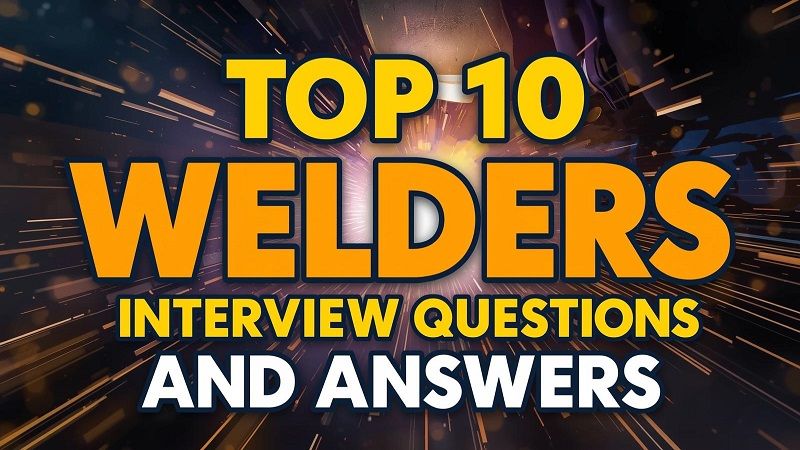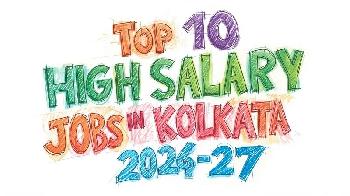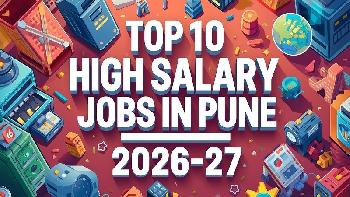Preparing for a welder job interview? And need Welders Interview Questions and Answers? Great! Today we will discuss the Welders Job Interview Preparation and their answers in a simple, conversational way. This will not only help you understand what can be asked in the interview but will also make it easier to answer.

Who are Welder?
Who are welders? Let's understand it as if we are talking to a friend. Welders are individuals that connect metals. Suppose, in a situation when we have two pieces of metals and we need to get them joined together in a way that they will become a strong substance, this job is carried out by welders. However this is not a very simple job as it may appear; it needs much concentration, expertise and proper method.
Now you will say, "Hey brother, this is just joining metals!" But in reality this work is very special. Welders know which technique to use when, what temperature will be right, and how to weld so that the part made is durable and strong. Just like a chef knows which spice to add when, similarly a welder knows when to apply how much heat and pressure.
The work of a welder is not just to join metals, but they also have knowledge of machines, gas cylinders, and many types of equipment. They use techniques like MIG, TIG, Stick welding, each of which has its own specialty. For example, TIG welding produces very clean and strong welds, while Stick welding is a little quicker and better for heavy jobs.
As far as the work place is concerned, welders can be found everywhere. Whether it is building big bridges, ships, repairing cars, or making heavy machinery in a factory – welders are needed everywhere. Sometimes these people work on high buildings, sometimes inside the factory, and sometimes even on the road. Therefore, full attention has to be paid to safety, helmets, gloves and safety goggles are their best friends.
If you are wondering what is required to become a welder, then first of all you should like to work with your hands. Along with this, technical knowledge, understanding of reading blueprints and the art of operating machines are also necessary. Sometimes training or apprenticeship has to be done for this, so that you can become an expert in the real work.
Welders Job Vacancies
Let's get started.
1. Which are some welding methods that you master?
The question is normally asked in order to establish the extent to which you can weld.
Answer:
I have done some MIG, TIG and stick and stuff. I particularly prefer TIG welding, as it is somewhat sensitive, and one should pay attention to this process. I have engraved a variety of materials, aluminum, steel. I also did AWS certification and yes, this will ensure that I am qualified."
2. What are your practices regarding the safety rules?
In welding, safety is vital.
Answer:
Listen, I wear a helmet and gloves as well as safety goggles. This might appear to be a small inconvenience, but it is good safety-wise. I clean the work area, ensure that the gas cylinder is closed and also ensure that the ventilation is good before proceeding to work. When a coworker fails to adhere to the safety rules, I tell him about the necessity of utilizing them."
3. Have you used what welding tools?
The interviewer is hoping that you will share the experience you have acquired.
Answer:
I have been dealing with MIG, TIG and stick welding machines. I have also worked on cutting torches, grinders and welding positioners. Plasma cutters sometimes also have been used by me. Besides that, I have also employed fillet gauges and the ultrasonic testing instruments in examining the joint welds."
4. What has been the most difficult project so far?
This question is to know your problem-solving ability. Answer:
"Once I had to weld a large stainless steel structure, the design of which was quite complex and the time was also short. I first made a complete plan, worked together with the team and did quality check at every step.There occurred an inconvenience with the machine in between, I however did not surrender and solved the problem. Eventually the project was done on time and the client was also happy."
5. How do you ensure the quality of welding?
It is the biggest responsibility of a welder to pay attention to quality.
Answer:
"After every weld, I check carefully whether there are any cracks or holes. If needed, I also do dye penetrant or ultrasonic testing. Also, I pay special attention to current, voltage and speed during welding so that the weld is strong."
6. What will you do if someone in your team does not follow the safety rules?
This question is to know how you work in a team.
Answer:
"If a colleague is not following the safety rules, then first of all I talk to him and explain why these rules are important. If he does not follow them, then I inform my senior. There should be no compromise on safety, this is my personal policy."
7. With which metals have you done welding?
This question shows the diversity of your experience.
Answer:
I have been working with steel, stainless steel, aluminum, cast iron and copper. The particular metal is a particular process and I employ the appropriate process for the particular metal.
8. How do you solve problems that arise during welding?
This question is about your problem-solving ability.
Answer:
"If there is a lot of spatter in the welding or the weld looks weak, then the first thing I do is check the machine settings. I check if the current, voltage, and speed are correct. If the material is dirty, I clean it. Sometimes the machine also has to be serviced."
9. Where do you maintain your technical knowledge?
The industry is constantly undergoing new changes thus one should be informed.
Answer:
I never stop monitoring new technologies regarding welding. I follow YouTube videos; I use magazines in the industry; whenever I have the time, I get to the training workshops as well. This never makes my skills stagnant."
10. What do you think of team work?
Faster and better work is the effect of teamwork.
Answer:
I am a team worker. I have been in a group in numerous projects. I always keep the team members in communication and assist whenever necessary. The use of synergy by teams makes work enjoyable and also enhances work productivity."
Some Additional Pieces of Advice which will come in handy
Always when you are answering be sure to give some examples of your experience. It implies to the interviewer that you have worked as well as read from books.
- During the response, be confident, do not sound arrogant.
- When you are not sure of the answer to a question, do not tell lies, but just tell the truth that you are willing to be taught.
- Just pay attention to your safety rules, as this is the most significant thing during welding.








ADD COMMENT